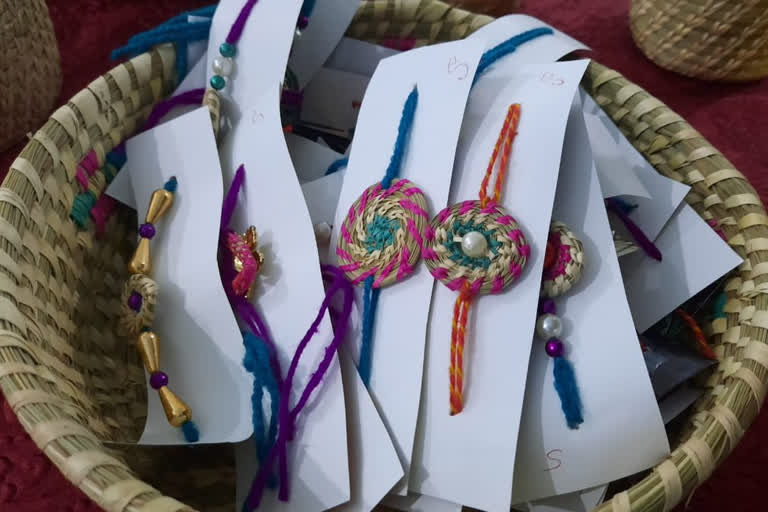Baripada (Odisha): Four self-help groups in Odisha's tribal-dominated Mayurbhanj district are making rakhis from dry Sabai grass that not only generates livelihood but also aims to reduce dependence on Chinese products.
In a first-of-its-kind initiative by Odisha Rural Development and Marketing Society (ORMAS), artisans of women SHGs are braiding and knotting the strands of Sabai grass into attractive rakhis.
According to reports, the objective is to avoid Chinese rakhi and cater to the scarcity of rakhis in the market amid Covid-19 as well as people save money which they have to bear more to buy a piece of rakhi in the market during the celebration of Raksha Bandhan.
Speaking to ETV Bharat, professional designer of ORMAS, Chandini Khandelwal, said, "Four women Self Help Groups are taking part in the initiative and three stalls are now functioning at Rairangpur, Baripada in Mayurbhanj district and one at Bhubaneswar to sell the rakhis."
"Sabai grass, Sandalwood, glass beads, and other materials are used for preparing the ‘rakhis’, which will be sold in known markets of the state. The objective is to celebrate Raksha Bandhan in an eco-friendly way as well as to address the scarcity of rakhis in the market amid the pandemic. The initiative will help SHG members earn some money during these tough times," she said.
The festival of Rakshya Bandhan is the mute witness to the lasting relationship between the two.
However this year, the loving sisters will tie eco-friendly rakhis to their brothers.
These rakhis have been made by the initiative of the Women of the Self Help Groups of ORMAS. These rakhis, made from natural organic materials, are not only attracting the customers in the market but also conveying an environment-friendly message.
Earlier, rakhis were being made from plastic-like substances which posed a threat to the environment. However, rakhis made by these women will not only strengthen the affectionate bond between brothers and sisters but also protect the environment.
The women of SHGs have made these rakhis using dried up ‘Sabai’ grass, paddy and rice.
For this, ORMAS extended its cooperation and also financial assistance. These women are earning some good amount of money by preparing rakhis with traditional indigenous materials available in the country during these difficult times of lockdown.
Along with this, these rural women are also making other eco-friendly products which have brought them appreciation at both national and international level.
These eco-friendly rakhis made from dried ‘Sabai’ grass which literally follows the message of the Prime Minister “Vocal for Local” also conveys a message that while celebrating any festival, we should first think of our environment and then our traditions and rituals.
Notably, around 70 lakh women members of six lakh Mission Shakti Help groups in Odisha have been playing a key role in State Government’s effort to contain Coronavirus.
The self-help group movement has spread across the state and is now on a firm footing.
Also Read: Jharkhand's silk rakhis pushing Chinese plastic threads out of



